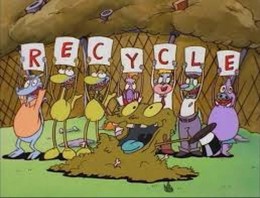The Cost of Recycling

Who else washes out their soup cans and peanut butter jars before putting them in the recycling bin?
Maybe you spend that extra time scrubbing peanut butter out of the folds of a plastic jar because you think it’s better for the recycling company, or — if you live in Seattle — because it is literally illegal to put food waste in the trash.
I’m not using the figurative meaning of “literally” here. To quote the Seattle Post-Intelligencer:
But on Jan. 1 [2015], Seattle will ban food and food waste in trash. Enforcement won’t start until July 1. At that time, any single-family trash container with more than 10 percent recyclables or food waste by volume will face a $1 fine on the next garbage bill.
The information about the new law came with a pile of other tips and rules about appropriately sorting our waste into trash, recycling, and compost, including the rule that we could carry our recycling down to the bin in a plastic or paper bag, but could not put bagged recycling into the bin; we have to unbag it first and put the bag in separately. If we have more than one plastic bag, we must unbag the recycling and then bag the bags together.
That just seems… well, it seems like too much, right? I already have to deposit my own checks and check out my own groceries and fund my own retirement; can’t I put a plastic bag stuffed with recyclable paper into a bin and let the recycling plant sort it out?
Maybe not. A new Planet Money story suggests that one of the reasons we might be asked to separate our plastic bags from our cardboard boxes is so that recycling facilities can literally toss that plastic right back into the trash.
(I’m not using the figurative meaning of “literally” there, either.)
To quote Planet Money’s Stacy Vanek Smith:
One day it’s profitable to recycle a bottle, and the next day some global economic number changes and that same bottle is trash.
This means that not everything we put into the recycling bin gets recycled, and it means that all that time I spend trying to get the last little bits of shampoo out of the shampoo bottle — which is impossible, the bottle just fills with infinite shampoo suds — might be a huge waste of effort on my part. Here’s another explanation, from the podcast:
So oil seems like something maybe totally unrelated, but of course, plastic bags are a petroleum product. They’re made from oil. So if oil gets cheap, that means it’s cheap to make fresh plastic. So if you’re in the business of making toothbrushes, it’s cheaper to buy freshly made plastic than it is to buy recycled plastic — at least recycled plastic from plastic bags.
Recycling plants won’t recycle plastic — or paper, or anything else — if they can’t make a profit. Planet Money states that the largest recycling company in the country, Waste Management, no longer recycles plastic bags. The podcast also notes that the profit margin on recycling paper is getting smaller; the U.S. used to sell their recycled paper to China, but now China is buying cheaper European recycled paper and U.S. recycling companies are losing money. The implication is that if the profit continues to drop, these recycling companies may start tossing paper into the trash, too.
I find this story uncomfortable on a number of levels. It is frustrating to read that my carefully sorted and washed recyclables, the same jars and bags that I cannot legally put into the trash, might end up in the trash anyway. It is even more frustrating to learn that what all of us Earth Day kids were taught was a noble “save the planet!” endeavor is actually as profit-based as anything else — and if the profit goes away, so does the noble sentiment.
Also, think of all of that recyclable material that has already ended up in landfills, even though we sorted it for recycling.
Think about it.
Then listen to the Planet Money podcast and let us know whether you plan to continue washing peanut butter residue out of plastic bottles.
Support The Billfold
The Billfold continues to exist thanks to support from our readers. Help us continue to do our work by making a monthly pledge on Patreon or a one-time-only contribution through PayPal.
Comments